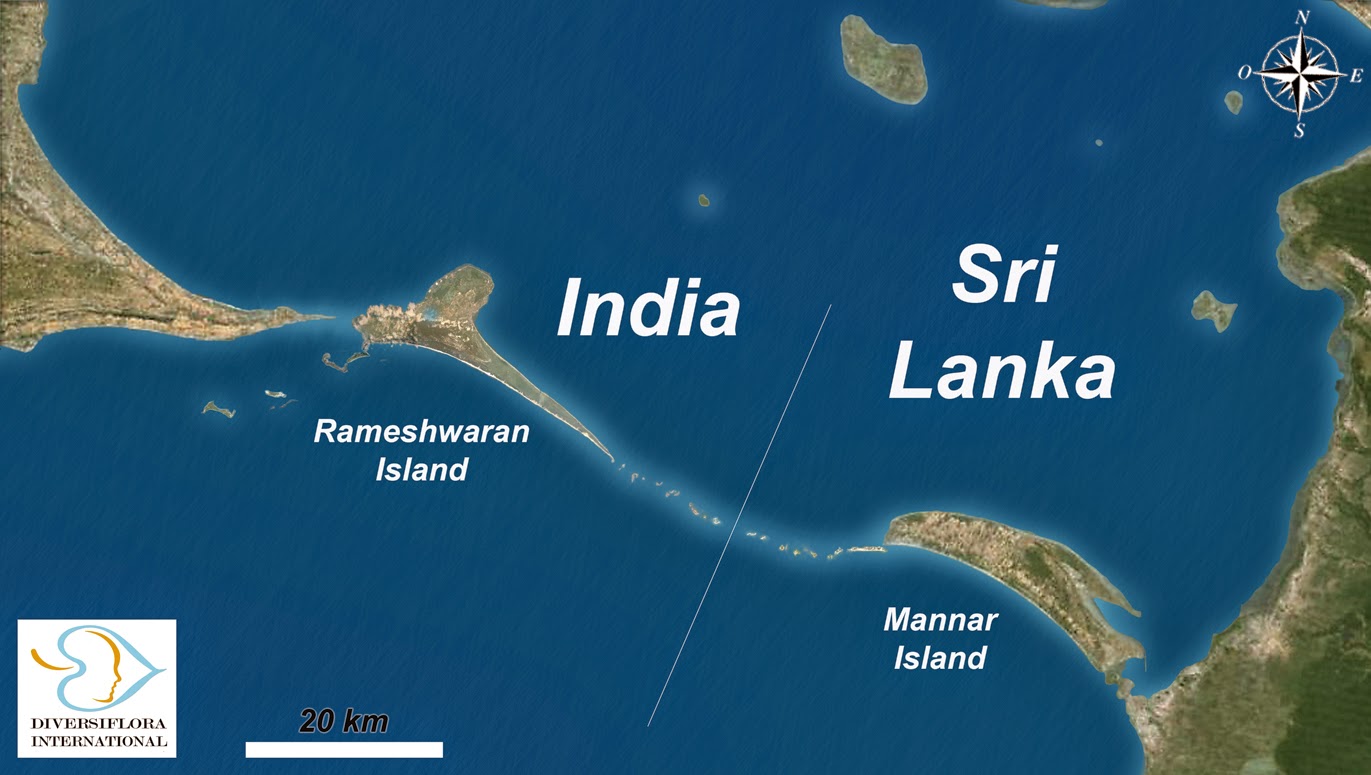The Adams Bridge Great Miracles Of India
Adam's Bridge also known as Rama's Bridge or Rama Setu (Tamil:
Irāmar pālam, Sanskrit: rāmasetu), is a chain of limestone shoals, between Pamban Island, also known as Rameswaram Island,
off the south-eastern coast of Tamil Nadu, India, and Mannar Island, off the north-western coast of Sri Lanka.
Geological evidence suggests that this bridge is a former
land connection between India and Sri Lanka.
The bridge is 50 km (30 mi) long and separates the Gulf of Mannar (south-west) from the Palk Strait (northeast).
Some of the sandbanks are dry and the sea in the area is very shallow, being only 1 to 10 metres (3 to 30 ft)
deep in places, which hinders navigation. It was reportedly passable on foot up to the 15th century until storms
deepened the channel: temple records seem to say that Adam's Bridge was completely above sea level until it broke
in a cyclone in 1480.
The bridge was first mentioned in the ancient Indian Sanskrit epic Ramayana of Valmiki.
The name Rama's Bridge or Rama Setu (Sanskrit; setu: bridge) refers to the bridge built by
the Vanara (ape men) army of Rama in Hindu theology with instructions from Nala, which he
used to reach Lanka and rescue his wife Sita from the Rakshasa king, Ravana. The Ramayana
attributes the building of this bridge to Rama in verse 2-22-76, naming it as Setubandhanam,
a name that persists until today.
The sea separating India and Sri Lanka is called Sethusamudram meaning "Sea of the Bridge".
Maps prepared by a Dutch cartographer in 1747, available at the Thanjavur Saraswathi Mahal
Library show this area as Ramancoil, a colloquial form of the Tamil Raman Kovil (or Rama's Temple).
Another map of Mughal India prepared by J. Rennel in 1788 retrieved from the same library called
this area as "the area of the Rama Temple", referring to the temple dedicated to Rama at Rameswaram.
Many other maps in Schwartzberg's historical atlas
and other sources such as travel texts by Marco Polo call this area by various names such as
Sethubandha and Sethubandha Rameswaram.
The western world first encountered it in "historical works in the 9th century" by Ibn Khordadbeh
in his Book of Roads and Kingdoms (c. 850), referring to it is Set Bandhai or "Bridge of the Sea".
Later, Alberuni described it. The earliest map that calls this area by the name Adam's bridge
was prepared by a British cartographer in 1804. Some early Islamic sources refer to a
mountain in Sri Lanka as Adam's Peak, where Adam supposedly fell to earth and describes Adam as
crossing from Sri Lanka to India on what became known as Adam's Bridge.
The studies under "Project Rameswaram" of the Geological Survey of India (GSI),
which included dating of corals, indicate Rameswaram Island evolved beginning 125,000 years ago.
Radiocarbon dating of samples in this study suggests the domain between Rameswaram and Talaimannar
may have been exposed sometime between 7,000 and 18,000 years ago.[30] Thermoluminescence dating by
GSI concludes that the sand dunes between Dhanushkodi and Adam's Bridge started forming about
500–600 years ago.
An investigation by the Centre for Remote Sensing (CRS) of Bharathidasan University, Tiruchi,
led by Professor S.M. Ramasamy dates the structure to 3,500 years. In the same study,
carbon dating of some ancient beaches between Thiruthuraipoondi and Kodiyakarai shows the
Thiruthuraipoondi beach dates back to 6,000 years and Kodiyakarai around 1,100 years ago.
Another study suggests that the appearance of the reefs and other evidence indicate their
recency, and a coral sample gives a radiocarbon age of 4,020±160 years BP.
Congratulations @blueant! You have completed some achievement on Steemit and have been rewarded with new badge(s) :
Click on any badge to view your own Board of Honor on SteemitBoard.
For more information about SteemitBoard, click here
If you no longer want to receive notifications, reply to this comment with the word
STOP